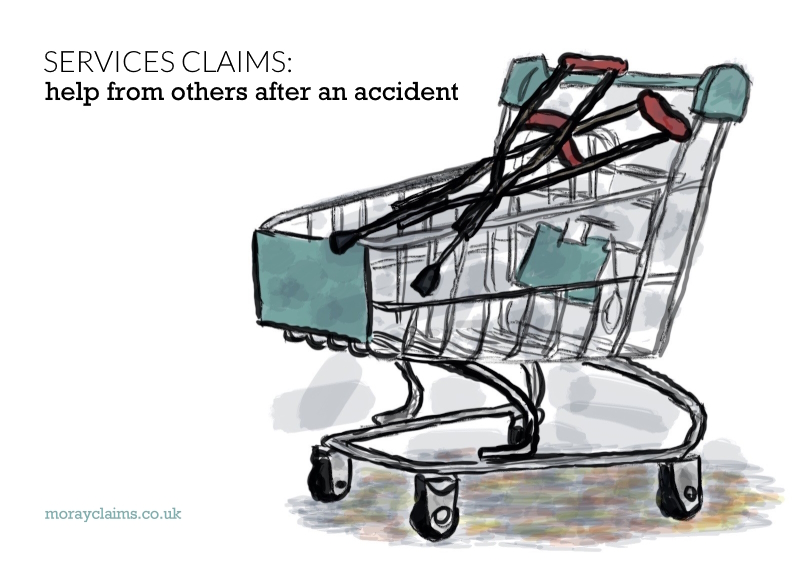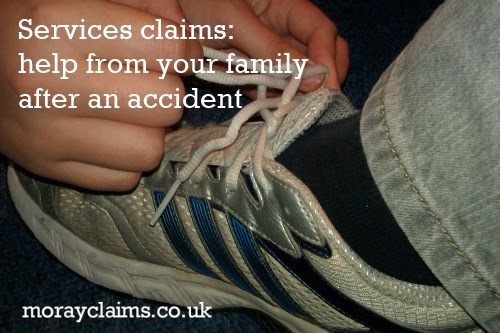
(NOTE: This is an updated version of a post originally published on this website on 24 October 2013).
If you have been injured in an accident, it may well have put you out of action for a while with the result that you needed help from members of your family.
The law in Scotland allows relatives to claim compensation for the time they give up to help you.
This might seem strange: you would hope and expect they would do that anyway, without requiring any financial reward.
On the other hand, if they were not there to help you, it would make life awkward, at best, and unmanageable, at worst, unless you could get help from some other source.
So it makes sense that compensation should be available for them for the time involved in providing you with assistance.
Their claim does not stand on its own; it can only be made as part of a personal injury claim by you, the injured person.
Two Types of Services Claim
There is the possibility to make a claim for two different types of services under the Administration of Justice (Scotland) Act 1982.
Help You Have Received From Others …
Section 8 enables the injured person to claim for services provided by relatives to the point of conclusion of the case (whether by negotiation or court order) – and beyond that (i.e. a claim for “future services”) if it appears that the services will continue to be necessary.
Services typically will include hospital visits, assistance with driving, washing or dressing or time spent cooking or shopping or doing housework.
In situations where the injured person becomes self-sufficient again after a few weeks, courts will take a broad brush approach to these claims and award a few hundred pounds compensation.
For the purposes of quantification in more serious cases, where services are required for a longer period, it can be helpful to try to divide the recovery period up into sections.
The initial period may be when the injured person is in hospital; the next period would be on their initial return home, including any reorganisation required to prepare the home for the person coming home, and covering perhaps the first few weeks when the level and intensity of services required would be at their highest; after that, there could then be a period when the level and types of services required diminish.
Services claims are often assessed on a notional hourly rate (usually no more than about £5 per hour) and so it can be helpful, if possible, if the services can be broken down into periods of time when a particular number of hours per day/week/month (whichever is easiest to calculate) were provided.
Again, for each period, it is helpful if the types of services provided can be summarised.
… And Help You Would Have Given To Others
The second type of claim that can be made for services is under Section 9 of the 1982 Act.
This enables the injured person to claim for the value of services which he or she would have provided free of charge to a relative but for the accident.
Typical examples include DIY, home decoration and maintenance, and gardening.
Where possible, it is useful to get estimates from local tradesmen, bearing in mind that the claim can only properly relate to the labour element (i.e. not materials, which would have been required to be purchased, in any event).
Possible Reform of Scots Law in relation to Services Claims.
A report called “Damages for Personal Injury” was published by the Scottish Law Commission (“SLC”) in December 2024.
The overal aim of their proposed changes is to modernise the regime for compensation for personal injury. One of four key areas they considered was awards of compensation for services and the definition of “relative” that is used when deciding whose services count.
Looking at the present law under the Administration of Justice Act 1982, SLC noted that the way in which “necessary” and “personal” services claims are determined had been criticised for being out of touch with reality.
The concern is that it is not fair to disallow claims where the services have not been provided to the injured person by someone in what might be classed as their ‘traditional’ family. Society and family structures have changed significantly since 1982 and the law should be updated to reflect that.
By way of comparison, in England and Wales, the person providing services does not need to have any particular relation to the injured person for the services to be “claimable”.
The suggested reform to the law which SLC have put forward would widen the definition of “relative” to include certain persons accepted into the family and former cohabitants. Likewise, those who actually provided necessary services (to include, for example, friends and neighbours of the injured person) would also be eligible for compensation.
If the SLC proposals become law, services rendered by any person will qualify for compensation as long as they were provided without there being a contractual right to payment.
The upshot of this is that the proposed reframing of the definition of relative will probably lead to an increase in the number and value of services claims being made.
How we can help
If you would like help in connection with a possible personal injury claim, get in touch with us for a chat.
All enquiries are free of charge and without obligation.
If we don’t find out from you the basics of what your query is about, we can’t know whether or not we can help you. And if we can’t help you ourselves, we probably known someone else who can help you.
Contact Peter Brash or Marie Morrison via 01343 544077 or complete and submit an online enquiry form to us by clicking HERE.
Make A Free Online Enquiry Now
